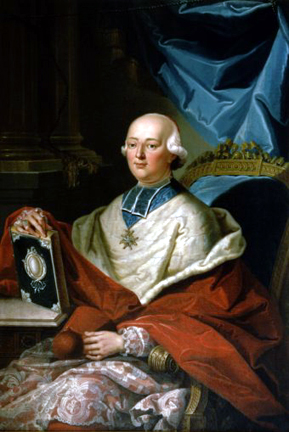Louis-René de Rohan
Louis-René-Édouard, Prince de Rohan (1734–1803) was a French nobleman and Roman Catholic bishop who played a significant role in the French Revolution and is perhaps best known for his involvement in the Affair of the Diamond Necklace, a scandal that discredited the French monarchy on the eve of the revolution.
Early Life and Career[edit | edit source]
Louis-René-Édouard de Rohan was born into the prestigious House of Rohan, which traced its lineage back to the medieval dukes of Brittany. As a member of one of the oldest and most influential families in France, Rohan was destined for high office in both the state and the church. He was educated at the Sorbonne, where he studied theology, and was quickly drawn into the ecclesiastical hierarchy, becoming a bishop at a young age.
Bishop and Diplomat[edit | edit source]
Rohan's career as a bishop was marked by his appointment to several important dioceses, including that of Strasbourg, where he was known for his lavish lifestyle and efforts to enhance the prestige of his office. His position in Strasbourg afforded him significant influence, both within the church and in the broader political landscape of France.
In addition to his ecclesiastical duties, Rohan was also a diplomat. He served as the French ambassador to the Holy See, where he was involved in negotiating complex relationships between France and the Vatican. His diplomatic skills were recognized by many, but his tenure was also marked by controversy, particularly regarding his lavish spending and the accumulation of debt.
The Affair of the Diamond Necklace[edit | edit source]
The event that would forever mar Rohan's reputation was his involvement in the Affair of the Diamond Necklace in 1785. This scandal involved a fraudulent scheme by which a necklace, valued at an enormous sum, was to be sold to Marie Antoinette, the Queen of France, through Rohan's intermediation. The scheme was orchestrated by a con artist, Jeanne de Valois-Saint-Rémy, who convinced Rohan that she was a close confidante of the Queen.
Rohan, eager to regain favor with Marie Antoinette, with whom he had previously fallen out, was duped into believing that the Queen wished to purchase the necklace discreetly. He facilitated the transaction, only for it to be revealed that the Queen had never ordered the necklace, leading to a public scandal that implicated Rohan and severely damaged the credibility of the monarchy.
Later Life and Legacy[edit | edit source]
Following the scandal, Rohan was arrested and tried before the Parlement of Paris, but he was ultimately acquitted. Despite his acquittal, his reputation was irreparably damaged, and he spent the remainder of his life in relative obscurity, overshadowed by the scandal.
Rohan's involvement in the Affair of the Diamond Necklace remains one of the most infamous episodes in the history of the French monarchy, illustrating the excesses and corruption that contributed to the revolutionary fervor of the late 18th century. He died in 1803, largely forgotten except as a footnote in the tumultuous history of the French Revolution.
Search WikiMD
Ad.Tired of being Overweight? Try W8MD's physician weight loss program.
Semaglutide (Ozempic / Wegovy and Tirzepatide (Mounjaro / Zepbound) available.
Advertise on WikiMD
|
WikiMD's Wellness Encyclopedia |
| Let Food Be Thy Medicine Medicine Thy Food - Hippocrates |
Translate this page: - East Asian
中文,
日本,
한국어,
South Asian
हिन्दी,
தமிழ்,
తెలుగు,
Urdu,
ಕನ್ನಡ,
Southeast Asian
Indonesian,
Vietnamese,
Thai,
မြန်မာဘာသာ,
বাংলা
European
español,
Deutsch,
français,
Greek,
português do Brasil,
polski,
română,
русский,
Nederlands,
norsk,
svenska,
suomi,
Italian
Middle Eastern & African
عربى,
Turkish,
Persian,
Hebrew,
Afrikaans,
isiZulu,
Kiswahili,
Other
Bulgarian,
Hungarian,
Czech,
Swedish,
മലയാളം,
मराठी,
ਪੰਜਾਬੀ,
ગુજરાતી,
Portuguese,
Ukrainian
Medical Disclaimer: WikiMD is not a substitute for professional medical advice. The information on WikiMD is provided as an information resource only, may be incorrect, outdated or misleading, and is not to be used or relied on for any diagnostic or treatment purposes. Please consult your health care provider before making any healthcare decisions or for guidance about a specific medical condition. WikiMD expressly disclaims responsibility, and shall have no liability, for any damages, loss, injury, or liability whatsoever suffered as a result of your reliance on the information contained in this site. By visiting this site you agree to the foregoing terms and conditions, which may from time to time be changed or supplemented by WikiMD. If you do not agree to the foregoing terms and conditions, you should not enter or use this site. See full disclaimer.
Credits:Most images are courtesy of Wikimedia commons, and templates Wikipedia, licensed under CC BY SA or similar.
Contributors: Prab R. Tumpati, MD

